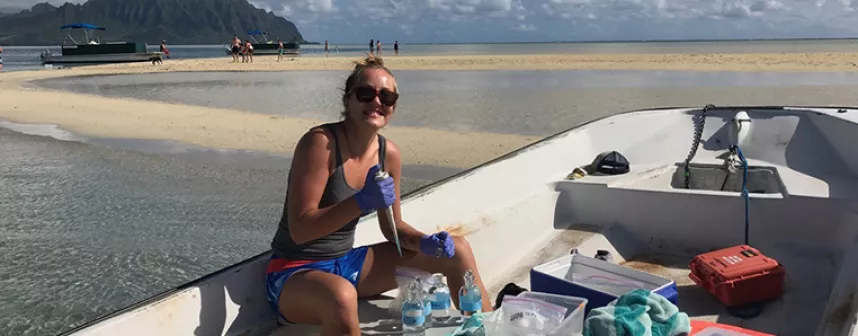Lucie Knor: From Bremen to Hawai'i - to conduct research
December 17, 2018
Hawai'i has become her second home. "It is the most beautiful place in the world," says Lucie Knor. "Almost every day you see a perfect rainbow and ask yourself: "Where did I end up here?" But it is also a place with dark sides, with poverty and homelessness, gentrification and real estate speculation, filthy rivers and tons of plastic in the sea. The young woman from Bremen perceives both sides. In her recently completed master's thesis at the University of Hawai'i, the graduate of Jacobs University Bremen dealt with heavy metals in rivers and canals. She will stay on the Pacific island for a few more years. In January, the 25-year-old will begin her doctoral thesis on the acidification of oceans.
Lucie Knor, who attended the Alte Gymnasium in Bremen, became interested in environmental issues very early on. At the age of 14 she became active at Greenpeace, two years later she took part in an expedition to Indian waters with young people from all over the world. On board the sailing ship "Pangaea" they fished garbage out of the sea, took samples to determine the water quality and dealt with topics such as coral mortality. This trip, she says, had shaped her ideas of what she wanted to do one day.
, Lucie Knor studied "Earth and Environmental Science" at Jacobs University © privateShe wanted to study environmental sciences after graduating from high school, that much was clear. Her studies were supposed to combine social and natural science approaches and later allow her access to academic research, but also to work in political institutions or non-governmental organisations. It should be international, because environmental issues cannot be dealt with in any other way. She chose Jacobs University. "The students, who come from all over the world, were an important factor in my decision," she says, "and after all, I grew up around the corner."
"Earth and Environmental Sciences" is the name of the course she chose - a decision she didn't regret. "My studies prepared me incredibly well for what I'm doing now. The program is very interdisciplinary, it deals with the entire Earth system and teaches everything a geoscientist needs." Including excursions to the Harz mountains, the Eiffel mountains, East Frisia, Helgoland, Ireland and Iceland. "They were among the best in the whole time."
One in particular really got her enthusiasm for geochemistry rolling, she says - her Professor Michael Bau, with whom she also wrote her Bachelor thesis. It was Bau who established contact with the University of Hawai'i, where Lucie Knor spent a semester abroad. "I liked it so much there that I applied for a Master's degree after graduating from Jacobs University in the summer of 2015".
, Already during her Master's thesis, she worked as a research assistant at the university on the effects of carbon dioxide (CO2) on the coastal coral reefs of Hawai'i © privateFor her master's thesis, she also explored less attractive corners of the island, like the man-made, heavily polluted Ala Wai Canal that flows around the famous Waikiki, a district of Honolulu. From untouched mountain streams down into the canal, she has taken water samples to measure exposure to heavy metals, particularly copper. Its concentration in the canal is considerable and rises during rain storms, suggesting that the main source is human input.
She arrived in Hawai'i, says Lucie Knor, it is nice to live there. The omnipresent sea is not only a study object for the oceanographer, she also uses it for surfing. She has discovered Thai boxing for herself, she is also politically active, at the university, but also beyond. "There are many problems in Hawai'i, especially because of the long colonial history of the islands and the exploitative tourism: poverty and homelessness, especially of the indigenous Kanaka Maoli and rising rent and food prices, which displace the local population. But here, too, environmentally conscious and solidary approaches to life are flourishing, which I support."
Already during her Master's thesis, she worked as a research assistant at the university on the effects of carbon dioxide (CO2) on the coastal coral reefs of Hawai'i. More than 20 percent of the CO2 emitted worldwide was absorbed by the oceans, where it increases acidity and makes life difficult for many organisms - especially those with shells or housings made of calcium carbonate, such as corals or pteropods. In her doctoral thesis, Lucie Knor will investigate exactly what this CO2 does, and where there might sources of resilience.
This text is part of the series "Faces of Jacobs", in which Jacobs University is featuring students, alumni, professors and employees. For more stories, please have a look at www.jacobs-university.de/faces
